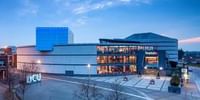Course topics include:
- Energy - the study of thermodynamics applied to the creation and use of energy.
- Solid mechanics - stresses and deformation experienced by components under service loads.
- Engineering materials - the mechanical properties of metals, polymers, ceramics and composites.
- Fluid mechanics - the study of gases and liquids, for example the flow of air over the wings of an aircraft, or the flow of air into a car engine.
- Manufacturing technology and systems - how components are made and how factories are organised.
- Dynamics - the study of moving bodies and machines, including acoustics and vibrations.
- Mechatronics - the study of electro-mechanical systems, for example the electronic control of engines and manufacturing processes.
- Engineering design - principles underlying the correct design of components; computer-aided design.
- Bioengineering - Engineering principles of the human body: design of medical devices and instruments.
Study abroad and work experience:
You can spend your fourth year studying abroad or a term working in industry. There are opportunities to study abroad through the Erasmus, Cluster and Unitech exchange programmes. The Department links with many universities including Katholieke University of Leuven, Belgium; INSA de Lyon, France; INPG Grenoble; Karlsruhe, Germany and KTH, Sweden.
Career opportunities:
As well as the potential for a career in mainstream mechanical or manufacturing engineering, graduates have found work in industries as diverse as film production and airlines. There is also a demand for specialist research and development work in industry, research organisations and universities. Opportunities exist for graduates in mechanical and manufacturing engineering to find employment in Ireland and elsewhere in the following areas:
- Engineering consultancy companies engaged in national and international engineering projects
- Large public utilities - Local authorities, transport, power generation etc.
- Companies manufacturing mechanical, electronic, biomedical and pharmaceutical products
- Specialist areas such as design, engineering management, financial services and IT










